JavaScript seems to be disabled in your browser. For the best experience on our site, be sure to turn on Javascript in your browser.
We use cookies to make your experience better. To comply with the new e-Privacy directive, we need to ask for your consent to set the cookies. Learn more .
- GBP - British Pound
- USD - US Dollar
- Login/Register

Business Plan: Coffee Industry in Ethiopia
Business Plan for the Coffee Industry in Ethiopia
The coffee business plan provides a detailed roadmap for entrepreneurs seeking to dive into the coffee industry in Ethiopia. The plan offers an in-depth analysis of essential commercial elements, equipping you with actionable insights to build a robust foundation for your venture. It meticulously explores the nuances of your business idea and considers the local market dynamics, competitive landscape, and the driving forces behind market growth.
The coffee business plan is focused on a particular product group within the coffee industry in Ethiopia. Specifically, it will be tailored for one of the below product groups:
- Coffee : Roast coffee; Instant coffee
Designed to be an indispensable resource, the coffee business plan serves is an essential guideline for both new and established enterprises in the industry. It addresses business planning, operations, marketing, organizational structure, and finance and outlines how to effectively manage them. Moreover, the document includes a detailed financial model crucial for attracting investors and securing loans or venture capital to fuel business growth.
The comprehensive business plan provides a framework for establishing a solid foundation for your coffee business in Ethiopia, keeping you on track to meet your goals. The tailored business plan will effectively analyze and present the details of your business, communicating its current state and future goals both internally and to interested third parties. It will serve as a foundational document for your business analysis, tracking, and development.
The coffee business plan offers a realistic, flexible, and data-backed action plan. It will assist you in calculating the risks associated with necessary decisions. The analysis is designed to cover business growth opportunities and challenges in Ethiopia, effectively navigating market complexities.
You will receive the business plan within 3 to 5 months after purchase. After project delivery, your team will have enough time to study it thoroughly and ask questions. Our team will be available for any clarifications or questions you might have in up to 3 months after the project delivery.
In the same industry and geographical region, we also offer detailed market reports, feasibility studies, due diligence studies, market entry, market development, product launch and product development studies, direct access to millions of potential new consumers, partner search and selection and more. Contact us for more information.
Business Description
This section of the coffee business plan involves an overview of your company. It will contain a detailed description of your business vision, goals, and key value proposition. In addition, the chapter provides an analysis of your products, including their unique features, benefits, and limitations.
The section answers the following questions:
- What are your company's goals, vision, mission, and values?
- What are the different types of products offered by your coffee business?
- How do your products solve problems or add value?
- What is the unique value proposition of your offering?
- What are the implications and the recommendations of the feasibility study conducted for it, if any?
Market Research
The market analysis section of the coffee business plan provides an overview of the market size, dynamics, and segmentation in volume and value terms for the last five years. It contains data on the trends and other aspects related to the development of the coffee industry in Ethiopia. The section also gives a forecast for the market development in volume and value terms in the next six years.
This chapter answers the following questions:
- What are the size and the dynamics of the market in Ethiopia in volume and value terms?
- How is the market segmented (by origin, product type, application, end-use, etc.)?
- Is the domestic market self-sufficient?
- What are the major trends and regulatory factors that affect the market?
- What are the drivers and challenges behind recent market developments?
- What is the degree of competition based on Porter's five forces?
- How has the volume, value, and segmentation of domestic production changed over the past five years?
- How is the value chain of the market formed? What is the structure of price formation?
- What are the average producer and retail prices on the market and how have their dynamics changed for the last five years?
- How has the volume, value, and segmentation of imports and exports changed over the past five years?
- What are the average import and export prices? How have their dynamics changed over the last five years?
- How has the consumption and the consumption per capita changed over the past five years?
- How will the market within the coffee industry in Ethiopia develop over the next six years under three possible scenarios (base, optimistic, and pessimistic)?
Consumer Behavior Survey and Customer Insights
A representative consumer behavior survey pinpoints the sentiments and thought processes behind consumption decisions. The coffee business plan will include a survey with 250 respondents who align with your target audience profile. This feature brings you insights that are directly applicable to your market, analyzing your target audience, and its segmentation. For a deeper understanding, you have the flexibility to add extra respondents at an additional fee and customize questions to get specific answers. Contact us with your specific requirements.
The consumer behavior survey and customer insights chapter answer the following questions:
- What products does your target audience purchase, and why?
- Which product characteristics are valued the most?
- Are consumers brand-loyal, or are they more likely to experiment?
- What are the needs and preferences of your customers?
- Which are the dominating price and product segments?
Marketing and Sales Strategy
This section of the coffee business plan presents you with a comprehensive guide outlining steps for the successful promotion and distribution of your products. The analysis focuses on estimating the penetration rate of your products, the total serviceable market, and the actual realistically obtainable market. Thus, it assesses the growth potential of your products in Ethiopia. That will help you select the proper strategy and market penetration tactics. As a result, it will support the establishment of your products and brand name, promoting loyalty and positive word-of-mouth advertising.
The marketing and sales strategy chapter answers the following questions:
- What are the values of key demographic indicators in Ethiopia?
- What are your key target segments and their demographics, needs, and preferences?
- What is the current marketing strategy of choice? Which communication and distribution channels are used to reach the target audience?
- What specific tactics are employed to achieve marketing goals and generate sales?
- How to communicate your value proposition to customers consistently and compellingly, and effectively connect with and appeal to the target audience?
- What is your brand positioning and how can you build brand awareness?
- How easy is it to expand the penetration rate of your brand and broaden the number of new customers in Ethiopia?
- What is the cost of your products and the pricing strategy that your venture currently relies on?
- What is the size of the total serviceable coffee market by product, price, and positioning segments?
- What is the size of the total realistically obtainable market within the coffee industry in Ethiopia?
Competitive Analysis and Strategic Comparison
This section of the coffee business plan analyzes the products of your top competitors in Ethiopia. It compares them with your own market offering, focusing on product characteristics and unique selling propositions (USPs).
- Which are the major companies in Ethiopia? What are their main characteristics and market shares?
- What is your company's market share (if any)?
- How intensive is the competitive landscape?
- What are the USPs of competing products? What are their strengths and weaknesses?
- How do your products distinguish themselves from the offerings of others?
- How to position your business on the market to create a unique value proposition?
Supply Chain Management
This supply chain section of the coffee business plan outlines how your business executes its day-to-day operations. It analyzes your supply chain management in several stages - raw materials procurement, core production phases, inventory management, and logistics. It also presents the key assets required for your business to operate effectively, including facilities, equipment, machinery, and key technology.
- What are the strategies employed by your business? What is their operational impact?
- What are the core operational activities required for your business to function effectively (manufacturing, logistics, etc.)? How are they managed?
- Where are the main business facilities (production plants, offices, warehouses, retail locations) situated? How do they support operational processes?
- What technologies and machinery do you need to ensure efficient operations?
- How does your business manage production capacity and stock levels?
- How can your business achieve its operational efficiency and productivity? How can it enhance overall performance?
- What are the specific operational goals that your business aims to achieve in the short- to medium-term through the long-term? Who might be a suitable future strategic partner?
Organizational Structure and Staffing
This section of the coffee business plan analyzes your business' recruitment needs, organizational structure, and management team. It provides a comprehensive overview of the decision-makers and the key employees within the team, focusing on their qualifications and roles. This chapter answers the following questions:
- What is the organizational structure of your company?
- Who are the key leaders and executives in the management team?
- What is the number and type of employees by department and geographic location?
- What are the backgrounds, experiences, and qualifications of the most important employees and managers? Can they support the strategic investment considered?
- What recruitment and onboarding strategy do you utilize?
- How is the company culture characterized?
Financial Analysis
This chapter of the coffee business plan includes a custom financial model with different scenarios, which allow you to better prepare for the future. The financial model will provide you with a forward-looking perspective on the financial health of your business for the next 15 to 25 years.
It will show you a clear path to profitability by analyzing the investment model, required financing, project revenues and expenses, cash flows, and discounted cash flows. It also incorporates a number of key project performance indicators such as net present value (NPV), discount rate, internal rate of return (IRR), return on investment (ROI), profitability index (PI), investment payback period, etc. They will enable you to optimize your business model from different financial standpoints.
The financial analysis section answers the following questions:
- What are the values of key local economic indicators in Ethiopia?
- What are the assumptions used for the financial projections?
- How is your business forecast to fare during the next several years financially?
- What is the expected revenue, profit margin, and return on investment of your coffee business?
- What is the cost breakdown of the operation?
- What is the anticipated level of cash inflows and outflows?
- What is the amount of the investment needed? How will it be utilized?
- What is the overall effectiveness of the investment?
- How profitable is the investment project expected to be based on the internal rate of return (IRR)?
- How long does it take for an investment to pay back its initial cost?
The financial model is built on three different scenarios, which allow you to better prepare for the future. The high-level data of the financial model can support optimizing your financial efficiency and help you determine whether your financial expectations are economically sound and likely to come to fruition.
During the actual project implementation phase, you can use the financial model as a checklist, tracking, and updating of financial projections. Some of the largest global financial institutions have already backed up new business ideas and projects, based on our financial models.
Risk Management and Mitigation Strategies
The risks section of the coffee business plan in Ethiopia outlines the risks that can impact your project's success. Companies face several types of risk, including market risk, financial risk, operational risk, technological risk, and legal and regulatory risk. The chapter also includes risks associated with commodity pricing, regulatory changes, interest rates, foreign exchange exposure, future capital requirements, product life cycles, etc. It is imperative for your company to carefully evaluate these risks and implement mitigation strategies to ensure a realistic assessment of the venture's viability.
- What risks of technical, operational, market, financial, and legal nature is your business exposed to in the short- and medium-term?
- What strategies are employed as a way to mitigate those risks or work around them?
Action Plan
The action plan section of the coffee business plan provides a step-by-step guide for your business. It will outline the various stages your company will have to go through and a reasonable timeline for each step in the process.
This section answers the following question:
- What are the different stages that your business will have to go through?
- What is the implementation timeline for the various stages of the business plan?
Short Methodology
The coffee business plan is prepared using WMStrategy's research methodology. It includes a blend of qualitative and quantitative data. The market information comes from official sources and includes insights from at least 20 market experts (representatives of the main market participants), gathered through semi-structured interviews.
A crucial component of the methodology is the consumer behavior survey. It is an indispensable tool for monitoring customer sentiments and preferences. The business plan includes a survey with 250 respondents who align with your target audience profile. The survey methodology utilizes precision targeting to identify and engage respondents who closely match the profile of your target audience. Depending on your requirements, a survey with a larger sample of respondents can be commissioned and you can ask specific questions to get verified insights.
The approach also includes an in-depth financial analysis, which is built on carefully researched data, creating actionable insights for your business. The classic valuation method of discounted cash flow (DCF) is utilized. In the process, some key financial indicators are developed to serve you as a tool for performance tracking. The collected data is then applied in the analysis of the main business strategies, maximizing your probability of success in light of current market dynamics, trends, and challenges.
Business Plan Benefits
- Get an insight-based plan, 100% developed for your specific business, taking into account your goals, needs, and targets;
- Appeal to different investors and meet their diverse interests and criteria, including venture capitalists, angel investors, and private equity firms;
- Gain a comprehensive marketing strategy and tactics, developed to effectively reach and engage your customers;
- Get a clear understanding of the fundamental requirements, such as the physical resources, facilities, technology, and operational processes, necessary for your coffee business;
- Benefit from detailed financial projections and budgeting aimed at creating a coffee business that achieves sustainable and profitable growth;
- Back up your coffee business plan with a financial model that serves as a benchmark to track your current performance;
- Obtain evidence of your company's growth potential and alignment with market trends;
- Save invaluable time and resources and easily secure a loan approval;
- Get a detailed overview of your supply chain, along with current and possible future partnerships;
- Strategically compare your products to your competition;
- Acquire a concise coffee business model to present to stakeholders for a quick understanding of your activities;
- Provide stakeholders with information about the realistically obtainable market in the foreseeable future;
- Acquire an expert analysis of the strengths, weaknesses, opportunities, and threats of your endeavor;
- Effectively communicate your company's objectives to employees;
- Strategically assess the competitive position of your main rivals;
- Quickly and cost-effectively receive a strategic analysis of key indicators on the market;
- Find out what and why your target audience likes and purchases;
- Identify and reach the most relevant audience, making sure that the insights you gather are directly applicable to your strategic goals;
- Receive a clear outline of the risks faced, along with strategies to mitigate them.
Business Plan Users and Target Audience
The coffee business plan is ideal for people who plan to start or expand a company and want to bring their ideas into reality. The coffee business model provides real market data, clear and comprehensive analysis, and sound strategies. It will help make your coffee business more profitable, attract funding, establish new goals, mitigate expected risks, aim at higher growth, and uncover more opportunities. The coffee business plan is tailored for an audience, which could include the following stakeholders:
- Bank managers;
- Investment managers;
- Shareholders;
- Financial professionals;
- Angel investors and venture capitalists;
- Franchisors;
- Business partners;
- M&A managers;
- Family and friends.
This document is also suitable for people who want to gain a comprehensive understanding of your current operations, including internal and external users such as:
- C-suite executives;
- Industry strategists;
- Marketing professionals;
- Business development professionals;
- Management consultants;
- Product developers;
- Product marketers and strategists;
- Product managers;
- Project managers;
Business Plan - Anticipate Revisions
A step-by-step business plan is crucial when starting a new business. It is an effective tool for measuring success, aligning goals, and taking advantage of new opportunities. You should consider revising your coffee business plan in the following cases:
- Before employing growth strategies or launching new products;
- When implementing a new organizational structure;
- To address changes to the industry or legislation;
- When new market trends emerge;
- When raising capital;
- When preparing to sell your business;
- At regular intervals (e.g., annually).
Deliverables
- Detailed and personalized coffee business plan in PDF format;
- Excel-based, editable financial model covering several possible scenarios that can serve as a benchmark to check and track your business performance;
- Compelling investor pitch deck PPT presentation;
- Business model canvas, a 1-page overview of your business model.
TABLE OF CONTENTS
INTRODUCTION
BUSINESS PLAN METHODOLOGY
BUSINESS DESCRIPTION
- Company Overview
- Contact Details
- Short Company History and Business Operations
- Goals, Vision, Mission, and Values
- Product Portfolio, Characteristics, and Unique Selling Proposition
- Feasibility Study Conclusions and Recommendations
EXECUTIVE SUMMARY
- Business Model Canvas
MARKET RESEARCH
- Characteristics and Analysis of the Market within the Cocoa Industry in Ethiopia in 2019-2023
- Volume, Value, and Dynamics of the Market
- Structure of the Market by Origin
- Structure of the Market by Product Types
- Trends and Insights on the Market
- Five Forces Analysis
- Drivers and Challenges that Will Affect the Future Development of the Market
- Characteristics and Analysis of the Production in Ethiopia in 2019-2023
- Volume, Value, and Dynamics of the Domestic Production
- Structure of the Domestic Production by Product Types
- Characteristics and Analysis of the Prices in Ethiopia in 2019-2023
- Value Chain Analysis and Structure of Price Formation
- Characteristics of the Producer Prices by Product Types
- Characteristics of the Retail Prices by Product Types
- Overview and Analysis of the Imports to Ethiopia in 2019-2023
- Volume, Value, and Dynamics of the
- Structure of the Imports by Product Types
- Main Countries Exporting to Ethiopia
- Average Import Prices by Product Types
- Overview and Analysis of the Exports from Ethiopia in 2019-2023
- Volume, Value, and Dynamics of the Exports
- Structure of the Exports by Product Types
- Main Countries Importing from Ethiopia
- Average Export Prices by Product Types
- Characteristics of the Consumption in Ethiopia in 2019-2023
- Volume, Value, and Dynamics of Consumption
- Volume, Value, and Dynamics of the Per Capita Consumption
- Balance between Supply and Demand in the Market
- Forecast for Development of the Market within the Cocoa Industry in Ethiopia in 2024F-2029F in Three Possible Scenarios (Base, Optimistic, and Pessimistic)
CONSUMER BEHAVIOR SURVEY AND CUSTOMER INSIGHTS
- Background Information and Survey Details
- Analysis of Customer Demographics
- Survey Results and Analysis
- Overview of Preferences and Consumer Behavior Insights
MARKETING AND SALES STRATEGY
- Overall Marketing and Sales Strategy
- Segmentation, Targeting, and Positioning
- Marketing Tactics and Communication Channels
- Sales Channels
- Pricing Strategy
- Analysis and Evaluation of the Obtainable Market Indicators
- Penetration Rate
- Serviceable Market
- Realistically Obtainable Market
COMPETITIVE ANALYSIS AND STRATEGIC COMPARISON
- Profiles of the Main Competitors on the Local Market
- Competitive Landscape on the Local Market and Market Shares of Competitors
- Product Offering of Competitor X
- Product Characteristics and Unique Selling Proposition
- Product Pricing
- Product Strengths and Weaknesses
- Product Offering of Competitor Y
- Product Offering of Competitor Z
- ... (similar analysis process for the top five competitors)
- Strategic Comparison of Product Offering with Competing Products
SUPPLY CHAIN MANAGEMENT
- Overall Strategy and Available Facilities
- Raw Materials Procurement
- Current Suppliers/Partners
- Possible Future Suppliers/Partners
- Production Process Design
- Inventory Management
- Operational Implications
- Planned Changes to Current Operations
ORGANIZATIONAL STRUCTURE AND STAFFING
- Organizational Structure
- Staffing - Key Personnel and Roles
FINANCIAL ANALYSIS
- Characteristics of the Local Economy
- Key Financial Assumptions
- Investment Needed (Amount, Projected Uses)
- Projected Set-Up and Operational Costs
- Projected Revenue
- Analysis of the Effectiveness of the Investment
- Discount Rate
- Return on Equity
- Value of Capital
- Annual Cash Flows
- Cash Flow from Operating Activities
- Cash Flow from Investing Activities
- Cash Flow from Financing Activities
- Project Performance Indicators
- Net Present Value (NPV)
- Internal Rate of Return (IRR)
- Profitability Ratio
- Payback Period (PBP)
RISK MANAGEMENT AND MITIGATION STRATEGIES
- Technical Risks
- Operational Risks
- Market Risks
- Financial Risks
- Regulatory and Legal Risks
SWOT ANALYSIS
ACTION PLAN
Technical data
| Product Type | PDF report; Excel financial model; PPT presentation; Business model canvas |
| Page Count | 200+ |
| Release Date | March 13, 2024 |
| Countries covered | Ethiopia |
| Products mentioned | Coffee |
Country Reports
- Feasibility Study: Coffee Industry in Ethiopia
- Commercial Due Diligence: Coffee Industry in Ethiopia
- M&A Due Diligence: Coffee Industry in Ethiopia
Hundreds of organizations around the world have used our research to create effective strategies.

- Technology and Consumer Electronics Leader “I would personally like to thank you for the great work you have done. You have been very professional and helpful throughout the whole process and not only were able to cater to all our needs and answer all our questions, but also were able to keep up our work pace, which is something we see very rarely” Product Manager at the client company
- Large Oil and Gas Producer “WMStrategy did a great job and helped us immensely, I cannot recommend them enough!” Business Strategist at the client company
- Leading Oil and Petrochemical Producer “We are really satisfied with your work and really impressed by your professionalism during our project!” Director at the client company
- Leading FMCG Direct Seller in Central and Eastern Europe “Great analysis – very professional and detailed. It helped us better understand the markets, their dynamics and the competition and benchmark our results against the market leaders in each country. Would definitely contact WMStrategy first again when we have similar projects.” Product Manager at the client company
- Regional Office of Global Consumer Research and Consulting Leader “We have been working with market research companies from all over Europe, but our work with WMStrategy surpassed all our expectations. They delivered on everything they promised in a professional and timely manner and were answering questions on this project more than 3 months after it officially finished. We have contacted them for more than ten projects after that and we continue to do so because we believe we have found a strong partner in them.” Account Manager at the client company
- Entrepreneur in Nigeria “Let me start by thanking you for a job very well done and detailed. We appreciate your professionalism and are very appreciative and impressed with your work!” Entrepreneur and Investor
- Leading FMCG Conglomerate in Asia “Your reports are amazing, they have been really helpful to us. We will definitely work with you again” Product Manager at the client company
- Leading Commercial Furniture Supplier in Asia “Your team is amazing – you are always able to answer all our questions, even the hardest ones. Your expert understanding of the markets and your general business thinking has helped us a lot in evaluating and expanding our business and horizons.” Market Research Director at the client company
Academia.edu no longer supports Internet Explorer.
To browse Academia.edu and the wider internet faster and more securely, please take a few seconds to upgrade your browser .
Enter the email address you signed up with and we'll email you a reset link.
- We're Hiring!
- Help Center

Business Plan Proposal

my company name is mars cafe that is located in ethiopia addis ababa
Related Papers
Tyrone Brackens
Islamic University
ABM Fahad Hossain
A lucrative and Realistic Business Plan on Coffee house business
IRJET Journal
Nurulain Sadri
Kennedy Mukuka
This strategic business plan details a structured plan of an investment in an African country, Zambia for the manufacture of plastic lumber from recycled plastic waste. The plan is in line with the strategy of XY Investments Inc. to diversify into untapped areas offshore without XY Investments Inc. footprint. This will ensure continued enhancements of human capital development, corporate social responsibility (CSR), enhanced robust risk management platform, treasury and accounting function. In this regard, a subsidiary company XY Poly Ltd. has been incorporated in Zambia as a vehicle through which the holding company, XY Investments Inc. will spread its corporate footprint into Africa as part of its grand strategy to meet long term objectives and a generic strategy to meet strategy in the short term.
Brian Richson
This is a business plan for a school for anyone who might not copy but get insight into the contents and flow of writing a business plan for such an institution or the like.
Joseph K Wulifan
It is conventional wisdom that new businesses be planned prior to their start-up hence prospective business founders are generally advised to develop formal plans of their proposed ventures. A business plan that serves as a blueprint or road map that provides direction and increases the firm’s chances for survival and success is thus essential. According to Kraten and Kenneth (2010), a business planning document represents “a nuts-and-bolts document” that clearly demonstrates that the business operator prepared to operate the business from day one. Andualem (1997) asserts that SMEs with regards to Ghana comprise activities that are independently owned and operated; managed by the owner; have a small share of the market; and employ 6-49 employees. This study investigated the impact of a business planning document on the growth of small scale businesses. Basically, the researcher chose the survey strategy in line with the observation that it is possible to use survey approaches within either a qualitative or quantitative research strategy. All the 50 respondents chosen purposively from the target population responded to the survey questionnaires. The study found that business planning influences the success or survival of SMEs. Also SMEs Enhance poverty alleviation, Improve per capita income, Enhance the quality of lives, Encourage technological innovations, Enhance export promotion, Enhance GDP growth, Encourage entrepreneurship, Accelerate employment generation, Ensure inter- and intra-regional decentralization, Serve as a countervailing force against the economic power of larger firms, Accelerate the achievement of wider socio-economic objectives, as well as Serve as cornerstone for socioeconomic growth and stability.
Mary Antonette Spandonis
Marketing Pllan for Father Urios Academy of Magallanes Incorporated
Loading Preview
Sorry, preview is currently unavailable. You can download the paper by clicking the button above.
RELATED PAPERS
Bilal Ibrahim Dan-Iya
annisa fitriyah
nurul nadia
Son Ca Bui Chuoi
… of the Fifth Entrepreneurship Workshop at …
Richard-Nicolas Lacroix
Udeme Usanga
Siti Mulyani
European Scientific Journal ESJ
Basanta Adhikari
Nigerian Journal of Management Sciences
Dr. Ernest J E B O L I S E CHUKWUKA
Julia von Wietersheim
https://www.ijrrjournal.com/IJRR_Vol.8_Issue.8_Aug2021/IJRR-Abstract045.html
International Journal of Research & Review (IJRR)
SME Business Plan
Adeola Temitope Aina
csupomona.edu
Jerry Kirkpatrick
Henok Zemedkun
Jeffri Wahab
Business Plan
MADU IKEMEFUNA
Nurul Syahirah
patricia chepkwony
Proceedings of the International Conference on Economics, Management and Accounting (ICEMAC 2021)
pathmi noerhatini
RELATED TOPICS
- We're Hiring!
- Help Center
- Find new research papers in:
- Health Sciences
- Earth Sciences
- Cognitive Science
- Mathematics
- Computer Science
- Academia ©2024

Business Plan Proposal for Coffee Shop: A Coffee Lover’s Blueprint
Coffee shops have become more than just places to grab a quick cup of joe. They have evolved into social hubs, community gathering spots, and creative sanctuaries. With the ever-increasing demand for high-quality coffee and the rise of the café culture, opening a coffee shop presents a compelling entrepreneurial opportunity.
In this article, I will outline the key components necessary for launching and running a great coffee shop.
Table of Contents
1. Executive Summary
Additionally, the executive summary delves into your target market, identifying the specific demographics, preferences, and needs of your potential customers. It highlights the competitive advantage your coffee shop possesses, whether it’s through superior quality, innovative offerings, exceptional customer service, or a combination of factors that sets you apart from existing market players.
In essence, the executive summary acts as a captivating hook, designed to pique the interest of potential investors and partners by succinctly communicating the most compelling aspects of your coffee shop business plan. It serves as a persuasive tool, enticing stakeholders to delve further into the details of your comprehensive proposal.
2. Market Analysis
In order to achieve greatness in the coffee industry, a deep understanding of the market and target audience is essential. Conducting a comprehensive market analysis becomes the foundation for making informed business decisions. By analyzing the industry, you can identify emerging trends that shape consumer preferences and demands. This knowledge enables you to tailor your offerings and stay ahead of the competition.
Examining local demographics is another critical aspect of market analysis. Understanding the age groups, income levels, and lifestyle preferences of the target market allows you to align your coffee shop’s offerings with their specific needs and desires. For example, if the area has a younger population with a preference for specialty coffee, you can focus on providing unique and artisanal coffee options.
3. Unique Selling Proposition (USP)
Consider various factors that can contribute to your USP. It could be a specific coffee brewing method that creates a distinct flavor profile, a signature blend crafted from premium beans sourced directly from growers, or a strong commitment to sustainability and ethical sourcing practices. Whatever aspect you choose, it should be something that resonates with your target audience and aligns with their values and preferences.
4. Menu and Product Offering
To create an enticing coffee shop experience, it is important to craft a diverse menu that caters to a wide range of tastes and preferences. In addition to the classic espresso-based drinks like cappuccinos and lattes, consider incorporating alternative brewing methods such as pour-over, French press, or cold brew. This variety allows customers to explore different flavors and brewing techniques, adding depth to their coffee experience.
Expanding beyond beverages, it is beneficial to develop a selection of artisanal pastries, light meals, and healthy snack options. Freshly baked croissants, muffins, and scones can complement the coffee offerings and entice customers with their delicious aroma. Additionally, offering options like salads, sandwiches, and wraps caters to those seeking a light and satisfying meal.
You create a coffee shop that appeals to a broad range of customers by curating a diverse menu that incorporates various brewing methods, artisanal pastries, light meals, and conscious ingredient sourcing. This attention to variety and quality enhances the overall coffee experience and fosters customer satisfaction and loyalty.
5. Location and Facilities
Seek out areas with bustling foot traffic, such as busy shopping districts or near offices and educational institutions, to maximize visibility and attract potential customers. Additionally, a vibrant community atmosphere can contribute to a steady flow of patrons.
When evaluating potential locations, carefully consider the size of the space. It should be spacious enough to accommodate both seating areas for customers and a well-organized production area for coffee preparation. This ensures efficient workflow and a comfortable environment for both staff and customers.
6. Marketing and Promotion
To ensure the longevity of your coffee shop, it is essential to develop a robust marketing strategy that effectively raises awareness and attracts customers. A combination of online and offline marketing channels can be leveraged to reach a broader audience.
Engaging with customers is key to building loyalty. Implement loyalty programs that reward repeat visits and offer personalized discounts. Regularly introduce specials, seasonal promotions, or limited-time offers to keep customers engaged and entice them to try new offerings.
7. Operations and Management
When outlining the operational aspects of your coffee shop, it is crucial to address staffing, training, and day-to-day processes. Clearly define roles and responsibilities for each team member, placing strong emphasis on providing exceptional customer service and product knowledge. Implement efficient inventory management systems to ensure a smooth supply chain and establish reliable relationships with suppliers.
Read more about: Business Plan for Selling Coffee Online: From Farm to Digital Cup
8. Financial Projections
Additionally, outline your profitability targets and set financial goals to drive growth and sustainability. By meticulously planning your finances and regularly monitoring your performance, you can make informed decisions, optimize your operations, and achieve long-term profitability for your coffee shop.
9. Risk Assessment
Unforeseen events can also pose risks, such as pandemics or economic downturns. In response to such challenges, develop contingency plans that allow your coffee shop to adapt and thrive. This could involve diversifying revenue streams, such as offering online ordering or delivery services, or implementing cost-cutting measures during lean times.
Opening a coffee shop requires careful planning, attention to detail, and a passion for providing an exceptional coffee experience. By crafting a comprehensive business plan that addresses market analysis, differentiation, operations, and financial projections, you will be well-positioned to navigate the competitive landscape and brew popularity in the coffee industry.
Frequently Asked Questions
Q: how much does it cost to open a coffee shop.
A: The cost of opening a coffee shop can vary depending on factors such as location, size, equipment, and renovations. On average, it can range from $80,000 to $300,000.
Q: Do I need prior experience in the coffee industry to start a coffee shop?
Q: what permits and licenses are needed to open a coffee shop.
To learn more on how to start your own coffee shop, check out my startup documents here.
I (like you may be) knew the coffee industry well. I could make the best latte art around and the foam on my caps was the fluffiest you have ever seen. I even had the best state-of-the-art 2 group digital Nuova Simonelli machine money could buy. But I knew that these things alone would not be enough to lure customers away from the name brand established coffee shops.

Share This Story, Choose Your Platform!
Related posts, best ways to implement sustainable practices in your coffee shop, how to host events at your coffee shop, best coffee shop loyalty programs to implement, infusing style and substance: a blueprint for coffee shop design, infusing comfort and charm: small coffee shop design concepts.
- Search for:
- Subscribe To Emails
- Ways to Give
- 2023 Annual Report
- Become a Fellow
- Become a Partner
- The Poverty Crisis
- Our Guiding Principles
- Making An Impact
- Our History
- Diversity Is Strength
- Strategic Partnerships
- Financial Summary
35% of beneficiaries in East Africa are women
- Success Stories
- Small Farmers
- Food Processors
- Small Business Owners
- Regenerative Business
- Food Systems Transformation
- Job Creation
- Latin America & Caribbean
- Ways to give
- RFPs & Consulting Opportunities
Sowing the seeds of success
Smallholder farmers who live in poverty rely on agriculture...
- Resource Center
- Ways To Give
REgrow Yirga revives one of the world’s most celebrated coffee origins: Yirgacheffe in Southern Ethiopia
The REgrow Yirga project funded by USDA, JDE, and Peet's Coffee, in partnership with Kew, aims to enhance the sustainable competitiveness of the Ethiopian coffee sector through increased productivity, improved supply chain performance, strengthened market linkages, and a more facilitative enabling environment.
U.S. markets are constantly seeking coffees from new origins that offer unique flavor profiles, are sustainably and organically grown, and tell a compelling story about the people involved in production from cherry to cup. No country is better positioned to serve that need than Ethiopia, which already produces some of the best tasting coffees and has the potential to market more than 6,000 heirloom varieties, many of which are still unidentified and grow wild in the vast southwestern forests. Today, more than half of coffee consumed in the U.S. is specialty, indicating an opportune time for Ethiopia to increase coffee exports significantly and hook U.S. consumers on Ethiopian coffee. The right market system interventions can unlock the sector’s latent potential, and Ethiopia can reclaim its position at the epicenter of coffee.
REgrow Yirga supports the strategic objectives set out in the Comprehensive Ethiopian Coffee Strategy and Implementation Roadmap (CECSIR) by the Ethiopian Coffee and Tea Authority. The project will implement a set of tested market-driven solutions and leverage private sector resources and expertise to address root causes that constrain Ethiopia’s coffee sector from reaching its full potential.
The project will directly benefit 45,000 smallholder coffee farmers and 45 cooperative and private wet mills by addressing production and quality challenges. REgrow Yirga will also work with key market system support actors to provide high-quality services. Indirectly, the project will benefit farming households via improved market conditions and income, particularly if stumping payments and additional coffee income are invested in nutrition, health, and education. In addition, the project aims to improve the overall business environment to the benefit of international traders; increasing foreign exchange flows will also unlock opportunities in sectors beyond coffee.
The project is scheduled to run until mid-2025 and is situated in the Gedeo Zone (known for its famous Yirgacheffe coffee) in Southern Ethiopia. REgrow Yirga is part of a portfolio of coffee projects TechnoServe implements within Ethiopia all aimed at increasing coffee farmers’ income.
Project Objectives
The two key objectives of the project are
- Increased productivity in the coffee sector through improved practices; and,
- Increased trade in Ethiopian coffee, by both volume and value.
These objectives will be met through three activities:
- Train farmers in good agricultural practices and incentivize farm rehabilitation,
- Improve Supply Chain Performance through Coaching Washing Stations and Facilitating Market Linkages,
- Support Coffee Varietal Research, Business Service Providers, and Government Institutions.
Project Targets
• 45,000+ coffee farmers increase their income • 200%+ yield increases among stumping farmers; 30%+ across all EMERGENCE farmers • 14,500 ha under improved management • 40% of all farmers trained are women • 45 wet mills producing increased volumes of Q1/Q2 grade coffee • 2,250 jobs created • $87 million+ in coffee sales • $8 million+ private sector investment leveraged
The REgrow Yirga project is funded by USDA , JDE , and Peet’s Coffee , and is a partnership with Kew . Government partners include The Ethiopian Coffee and Tea Authority and Jimma Agricultural Research Center .
Related Content
Rwanda ikawa nziza cyane “best coffee quality” project (rwanda inc).
The Rwanda INC program is a 4-year initiative funded by the European Union, JDE Peet’s, and the Government of Rwanda to unlock the potential of Rwanda's coffee value chain by helping farmers, washing stations, and service providers access the information and financing they need to provide high-quality, high-value coffee to local, regional, and international markets.
Horticulture for Growth (H4G) program
Horticulture 4 Growth (H4G): An Initiative of the Agricultural Commercialization Clusters (ACCs) is a $6M, 5-year program being jointly implemented in Ethiopia by TechnoServe and the Agricultural Transformation Institute (ATI), funded by the Bill & Melinda Gates Foundation. The project aims to accelerate the transformation of Ethiopia’s horticulture sub-sector by…
Prosper Cashew: Strengthening Cashew Processing in Côte d’Ivoire, Ghana, and Nigeria
Prosper Cashew: Strengthening Cashew Processing in Côte d’Ivoire, Ghana, and Nigeria Prosper Cashew – Context: The global cashew market is a $12 billion industry and has grown almost seven times over the last four decades in terms of volume.
Your support fuels our mission.
This site uses cookies to optimize functionality and give you the best possible experience. If you continue to navigate this website beyond this page, cookies will be placed on your browser. To learn more about cookies, click here .
A Step-by-Step Guide to Performing an Ethiopian Coffee Ceremony
This traditional practice is culturally important, and includes several steps, including roasting and grinding coffee beans and serving coffee and snacks.
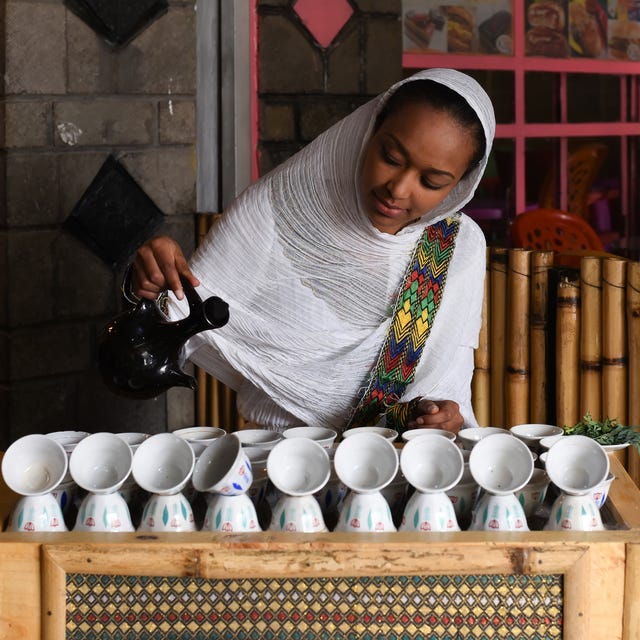
The traditional steps for an Ethiopian coffee ceremony
Things to keep in mind.
But the definition of Ethiopian coffee expands exponentially once beans are placed in a traditional Ethiopian vessel called a jebena. The distinctive clay pot is essential to the centuries-old Ethiopian coffee ceremony which promises social connection and the freshest cup of coffee you can make. But what is the ceremony all about? Tigist Reda, owner of the acclaimed Ethiopian restaurant, Demera , located in Chicago, helps explain, with photos from Ethiopian coffee ceremonies that she has hosted.
What is an Ethiopian coffee ceremony?
The daily practice of drinking coffee with family and friends is commonly called an Ethiopian coffee ceremony, particularly in the West, but “we call it ‘buna,’” says Reda, who grew up in Tigray, Ethiopia's northern region. The translation of “buna tetu” is to “come drink coffee with us,” underscoring the reverence given not only to coffee, but also to community.

When Reda speaks of the coffee that she grew up on, she’s describing a daily coffee ritual that’s elaborate without being fussy. “It happens every day, so I don’t even know if our mothers call it ‘ceremonial.’ It’s not a special occasion for them, it’s a way to start their day.”
Step 1: Create the ambiance.
Preparing the outdoor area where buna typically occurs is akin to setting a table, but with coffee as the centerpiece. As stools are gathered around the host, she arranges layers of fragrance — from fresh grass and flowers to burning incense of frankincense or myrrh — for a multi-sensory experience that links land and people. Ethiopian coffee, similarly to its cuisine, offers much interplay with smell. “Part of our dining experience is aroma; like what does it smell like? It's not just what you eat or what you drink. It kind of wakes up your senses, something in your spirit,” says Reda.

Reda roasts her green coffee beans of organic Yirgacheffe in the oven twice a week which offers plenty of inventory for the single pours of coffee that are offered on Demera’s standard menu, as well as the coffee for private events where buna may be served.
Note : While Reda has come across some jebenas made of ceramic and cups with handles, she prefers the classic way. Because the traditional jebena is made of decorative pottery, the vessel frequently cracks and is not usually passed down from generation to generation, but is often replaced. “The first time you use it you have to treat it so it can seal. You put it over heat, and then you turn it around, you let it cook, and then you can put sugar or coffee or something to seal," she says.
Step 2: Roast and grind the coffee beans.
Green coffee beans are the raw seed that’s been removed from the coffee cherry. The beans are washed several times then poured onto a hot pan over a heat source, like charcoal, and roasted until they take on a shade of deep ebony that resembles the beans that most are accustomed to. At Demera, buna is only served during private events where multiple jebenas are going at once to serve large crowds.
The beans are then ground by hand with a mortar and pestle into granules smaller than what a typical coffee grinder would produce, but not quite as fine as espresso. As the coffee is ground, the water boils in the jebena. Once the ground coffee is added, it simmers for a few minutes before serving. “There’s no filter because you’re just putting the water on top of the grounds, and then you let it settle,” Reda says.

Step 3: Pause.
Let it settle — that’s an edict for the coffee as much as for the people. If one has the privilege to participate in buna, patience is required since the course can take up to two hours to complete. Plan ahead by blocking off the necessary time and try to stay present. Buna is the antithesis of a mobile order pickup.
Step 4: Chat with those around you.
Engaging in conversation with the purpose of connecting with the greater community is a tenant of buna. Reda recalls the wafts of roasted coffee being an open invitation. “Your neighbors might come in, or if you move into a new neighborhood, you invite people over for buna and they invite you to get to know each other,” she says. Coffee is meant to be sipped slowly while absorbing the sights, smells, and sounds, making for a type of theater that beckons audience participation. With the virtues of hospitality in full effect, conversation should flow with ease.
Step 5: Have some snacks.
As the coffee roasts, staple bites such as plain popcorn, well-seasoned roasted barley that’s been mixed with chickpeas called kolo, injera and other savory items are served in a manner that mirrors the communal aspects of Ethiopian cuisine. The snacks are intended to both help keep up the rhythm of conversation over time and pad the stomach for the powerful cup(s) ahead. “You can almost call it dining where you’re having conversation and things are being served,” says Reda.

Step 6: Feel free to h ave another cup.
Buna occurs multiple times throughout the day. While the host prepares the ambiance just as before, she only roasts the coffee beans once. After the first pour, the jebena can be refilled twice more. As the day goes on, the pot is kept filled with its original coffee grounds, and a total of three cups of coffee, traditionally called abol, bereka and tona, with each getting weaker than the previous one.
Once the host pours the coffee into small, hand-painted ceramic cups there’s a cool-down period. Cups are traditionally handless, and Reda advises holding the cups from the edge to avoid getting burned.
- Honor elders. Etiquette largely comes into play during serving, which prioritizes elders. “Serve with your two hands, not one hand; get up for older people – and it's like total respect for your elder, so you serve the elder first.”
- Coffee is usually enjoyed black . Regionality seems to dictate what is or isn’t added to coffee. While most enjoy their cup of black coffee, some add sugar or ghee. Others add spices, such as whole cloves, to the coffee beans as they roast. “You put just one clove and when you roast it you have this aroma. Like you don’t taste the clove right up front because you just put one piece, but you kind of taste it in the back,” says Reda.
- Look for buna locally . If you're interested in participating in a traditional Ethiopian coffee service, reach out to an Ethiopian restaurant or cafe in your area to see if buna is offered.
Angela Burke is a freelance food writer and recipe developer based in Chicago. Her work has been nominated for a James Beard Award and can be found in Bon Appétit , Eater , Food & Wine , and other publications.

@media(max-width: 64rem){.css-o9j0dn:before{margin-bottom:0.5rem;margin-right:0.625rem;color:#ffffff;width:1.25rem;bottom:-0.2rem;height:1.25rem;content:'_';display:inline-block;position:relative;line-height:1;background-repeat:no-repeat;}.loaded .css-o9j0dn:before{background-image:url(/_assets/design-tokens/goodhousekeeping/static/images/Clover.5c7a1a0.svg);}}@media(min-width: 48rem){.loaded .css-o9j0dn:before{background-image:url(/_assets/design-tokens/goodhousekeeping/static/images/Clover.5c7a1a0.svg);}} Life

Bobbi Brown Launches Miracle Balm Palette

Ree's Summer Clothing Is on Major Sale Right Now

The 411 on 'Criminal Minds: Evolution' Season 3

Fans Adore Mariska Hargitay in New 'SVU' Promo

Blake Lively Stuns in Leather Floral Minidress

Hoda Kotb Is "Effortlessly Chic" in Black Jumpsuit

Tips for Getting the Kids to School on Time

What Is Simone Biles' Net Worth?

40 Creative First-Day-of-School Activities

Why Jordan Chiles Can't Compete in Olympic Final

The 26 Most Beautiful Libraries in the World

Hi, what are you looking for?
Capital Business

Infinix, UNESCO join forces to launch an AI robot project in Kenya

Government shelves £1.3bn UK tech and AI plans

Unilever-backed accelerator program awards 5 Kenyan startups Sh81mn

Intel to cut 15,000 jobs for fundamental changes

Apple sales rebound as AI bets scramble markets
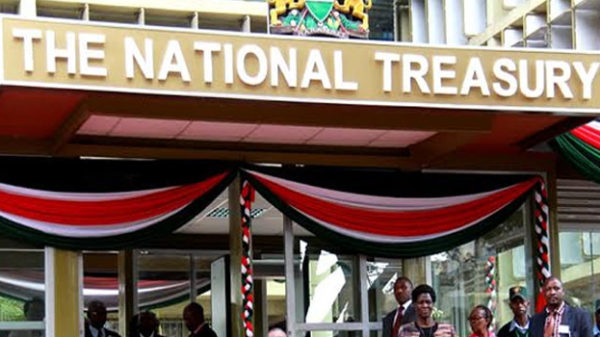
Mbadi seeks to preserve key provisions in Finance Bill 2024 through amendments

Treasury CS nominee Mbadi opposes tax hikes, advocates efficient revenue collection

Owaka appointed Pyrethrum Processing Company of Kenya chair

Ruto calls for stricter anti-graft laws to close loopholes

PSC advertises fresh jobs despite austerity measures

Introvert DJ Joe Mfalme on his journey to success in the music industry

The Evolution of e-commerce as told by Ronald Kaleu

Wowzi! You Want To Be An Influencer?

Going Full-Time: Julia Gaitho’s Move from Employment to Full-Time Content Creator

Digital Marketing and The Transformative Power of The Internet

Duale’s net worth jumps Sh129mn to Sh980mn on property appreciations, rentals

Environment CS nominee Duale put on notice Ololua Forest land grabbers

Decline in residential housing predicted across Europe in 2024: ifo

Expert decries U.S. debt surpassing $35 trillion ‘unhealthy’

Ex-CNN star Lemon sues Musk over cancelled X show

UK inflation rate: How quickly are prices rising?

The Importance of Attitude and Life Experiences in Career Growth

Capital FM commemorates anniversary of Chris Kirubi’s death

Finding Opportunity in the midst of the pandemic: AskKirubi

COVID-19: Lessons Learned and Future Direction for Entrepreneurs

Kirubi set to acquire half of Centum Plc following nod by CMA

Kirubi warns investors against fake cryptocurrency platform using his name
- Listen to Capital FM

Ethiopia approves $1.5-billion financial agreements with World Bank’s IDA
ADDIS ABABA, Aug. 2 (Xinhua) — The Ethiopian House of Peoples’ Representatives (HoPR), the lower chamber of parliament, on Wednesday endorsed financial agreements involving 1.5 billion U.S. dollars with the World Bank’s International Development Association (IDA), a fund for the poorest countries.
The agreements consist of a 1-billion-dollar grant and a 500-million-dollar concessional loan to Ethiopia, said Tesfaye Beljige, the government whip in parliament.
He said the financial agreements aim to support Ethiopia’s comprehensive reforms, the target of which is to stabilize the macroeconomic imbalances, with a particular focus on creating jobs, curbing inflation, addressing foreign exchange shortages, and facilitating structural adjustments.
The loan is interest-free with a six-year grace period and will be paid in 38 years. It conforms with the country’s loan administration strategy, Beljige said.
The agreements on the grant and loan was signed Tuesday by Ethiopia and the World Bank.

Real-time bank-to-bank transfers to be mandatory for lenders

New bill to remove water borehole drilling permit fees if passed

Agriculture
Tea farmers face payment delays amid unsold leaves at mombasa auction.
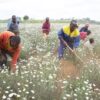
Satellite towns in Nairobi post double-digit land price growth
More on capital business.
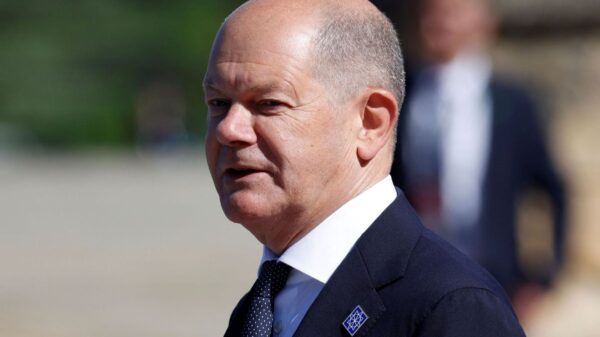
German cabinet approves contested budget plan
JULY 20 – The German cabinet finally approved its 2025 budget on Wednesday after weeks of negotiations, allocating a record 78 billion euros ($85...
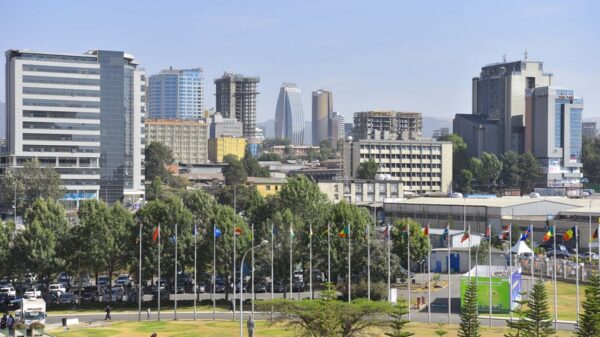
Ethiopia launches monetary policy reform for price stability, economic growth
ADDIS ABABA, July 10 (Xinhua) — The National Bank of Ethiopia (NBE), the central bank, announced the adoption of an interest-rate-based monetary policy regime...

Coffee exports bring Ethiopia $1.43bn past fiscal year
ADDIS ABABA, July 10 (Xinhua) — Coffee exports brought Ethiopia 1.43 billion U.S. dollars in revenue during the just-concluded Ethiopian fiscal year, the government...

Ethiopian parliament approves record budget for 2024/2025 fiscal year
ADDIS ABABA, July 5 (Xinhua) — The Ethiopian House of Peoples’ Representatives (HoPR), the lower house of parliament, approved a record budget of 971.2...

World Bank approves $207.6mn grant to support Zambia’s response to drought
LUSAKA, July 3 (Xinhua) — The World Bank has approved a 207.6-million-U.S.-dollar grant to support Zambia’s response to drought, a senior government official said...

EU approves 116.9 mln USD to boost security in Somalia
MOGADISHU, April 17 (Xinhua) — The European Union (EU) said it has approved 116.9 million U.S. dollars for stabilization efforts in Somalia. The funds,...

Indian gov’t approves 1.25 bln USD investment in AI projects
NEW DELHI, March 7 (Xinhua) — The Indian government on Thursday approved a 1.25 billion U.S. dollar investment in artificial intelligence (AI) projects, officials...

Kenya imports 200 megawatts of renewable energy from Ethiopia
NAIROBI, Kenya, Feb 28 – Energy Cabinet Secretary (CS) Davis Chirchir has revealed that Kenya has imported 200 megawatts of renewable energy from Ethiopia,...
Privacy Overview

IMAGES
VIDEO
COMMENTS
Background Of The Business And Justification For The Business Mars café is a new café partnership with an expected to open in July, 2018 G at the heart of Addis Ababa, and expected to give a standardize café service in Addis Ababa. Mars will specialize in Fast foods, Dinners, Coffee, Tea, Cappuccino, Frozen, Ice-cream, homemade cookies and ...
Are you passionate about coffee and dreaming of starting your own coffee house? In this video, we'll walk you through the steps involved in getting started, ...
AMEN Business Center plans on attracting this type of customer by: Providing the latest in computing technology based Sports Shows, Providing computer based Play Stations, Providing better access to Ethiopian Traditional Coffee and special Tea services, The third strategy focuses on building a social environment for our customers. A social ...
The coffee business plan provides a detailed roadmap for entrepreneurs seeking to dive into the coffee industry in Ethiopia. The plan offers an in-depth analysis of essential commercial elements, equipping you with actionable insights to build a robust foundation for your venture. It meticulously explores the nuances of your business idea and ...
Executive Summery This is a business plan proposal for the establishment of cafe having the name "Mars café" in Addis Ababa. ... Market Segmentation A restaurant/coffee house would provide one of the best food and beverage opportunities for more than 30,000 per month and adjacent neighborhoods. ... References Ethiopian business development ...
A lucrative and Realistic Business Plan on Coffee house business. Download Free PDF View PDF. IRJET. IRJET- Entrepreneurship Strategy Planning. 2020 • IRJET Journal. ... References Ethiopian business development service network (EBDSN), How to write a business plan 2005/6 E.C AAIT Entrepreneurship for Engineers lecture note/ Zerihun G. / 19 ...
In this article, I will outline the key components necessary for launching and running a great coffee shop. 1. Executive Summary. The executive summary is a crucial section within your business plan as it encapsulates the essence of your coffee shop venture. It provides a concise yet comprehensive overview of your business plan, highlighting ...
505504396 Coffee Shop Business Plan in Ethiopia. All. Course. entrepreneurships, Social. 15 Documents. Students shared 15 documents in this course. University St. Mary's University (Ethiopia) Info More info. Academic year: 2016/2017.
The coffee we serve comes exclusively from Ethiopia. Ethiopia is the origin country of the cof-fee plant and plays still an important role for the economic of the East African state. Thanks to the trustful and direct connection from the buna business team to Ethiopi-an trader and operator of coffee plantation we are able to ensure a high ...
The project is scheduled to run until mid-2025 and is situated in the Gedeo Zone (known for its famous Yirgacheffe coffee) in Southern Ethiopia. REgrow Yirga is part of a portfolio of coffee projects TechnoServe implements within Ethiopia all aimed at increasing coffee farmers' income. Project Objectives. The two key objectives of the project are
communication, which generates some of new business coffee drink ceremony each year. 2.2. Weaknesses 1. Too few people hold too much knowledge. 2. Despite the successful, long-term relationship with the Ethiopian people's coffee drink ceremony, coffee drink ceremony vulnerable in the event of a natural of the current supplier.
BUSINESS PLAN OWNERS: Business Name: Address: City, State, ZIP: Telephone: Cell Phone: Fax: Email: I. TABLE OF CONTENTS I. Ta Tabl blee of of Con Conte tent ntss [p [pag agee 1] 1] II. Executive Su Summary [page X] III. Bu Business Description [page X] IV IV.. Mar Marke kett Anal Analys ysis is [p [page age X] V. M Maarketing Pl Plan [page X] X ...
The proposed project would include: construction of about 100 new coffee washing stations, improvement to about 100 existing stations, construction of about 400 km of dry . Ethiopia - Coffee Processing Project
Business plan Internet-café Bishoftu, Ethiopia Samuel Teka 2020 Index 1. Introduction 1.0 Ethiopia & Bishoftu 1.1 Objectives 1.2 Keys to succes 1.3 Missions 1.4 Risks 2. Company 2.1 Company ownership 2.2 Start-Up Summary 2.3 Company locations and facilities 3.
Step 3: Pause. Let it settle — that's an edict for the coffee as much as for the people. If one has the privilege to participate in buna, patience is required since the course can take up to ...
ADDIS ABABA, Aug. 2 (Xinhua) — The Ethiopian House of Peoples' Representatives (HoPR), the lower chamber of parliament, on Wednesday endorsed financial agreements involving 1.5 billion U.S. dollars with the World Bank's International Development Association (IDA), a fund for the poorest countries.